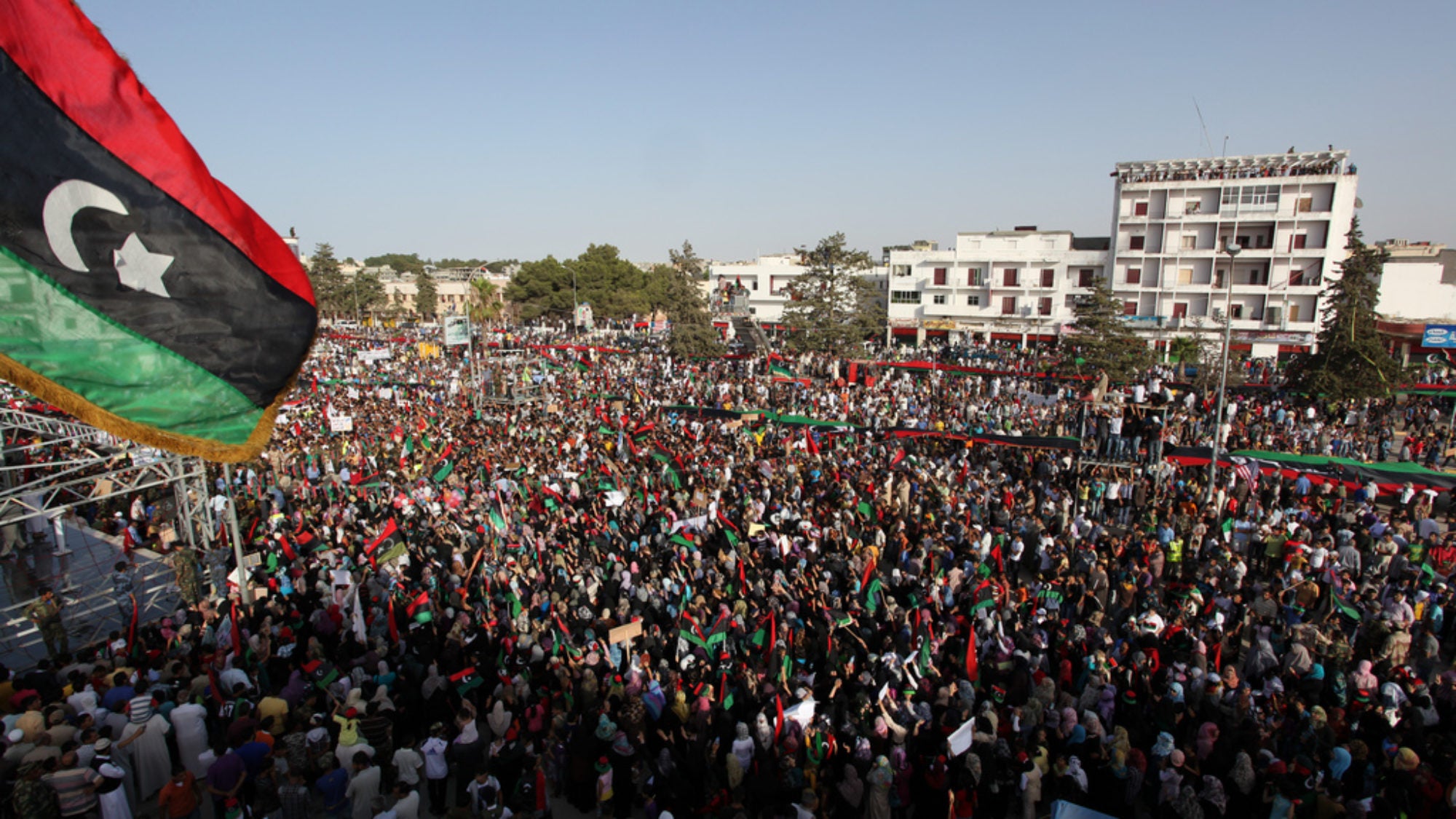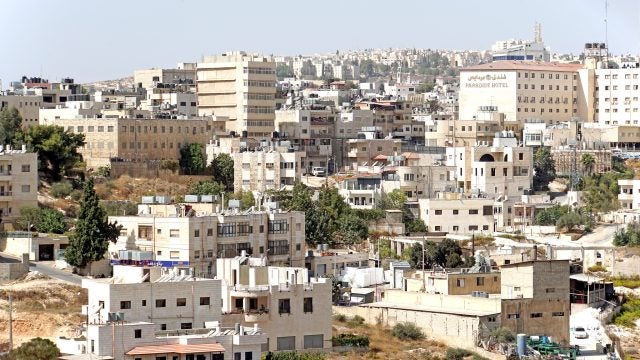
Title: Libya’s Civil War: US Abdication Providing a Playground for Foreign Intervention
Since Libyan warlord Khalifa Haftar initiated his effort to take Libya’s capital, Tripoli, by force on April 4, 2019, Libya has remained in a state of full-on civil war. The conflict involves not only competing forces within the country, but also foreign powers using Libyan clients as proxies for their regional interests. These external actors—primarily the United Arab Emirates, Russia, and Turkey, plus a host of supporting players—continue to exacerbate the chaos as they maneuver for long-term power. Meanwhile, the United States is absent.
A central tenet of US policy towards Libya after Qaddafi was to prevent outside actors from intervening in the country’s internal affairs. In that spirit, the United States pushed every foreign power interested in Libya into alignment with the principles of inclusive governance and equitable sharing of Libyan natural resources. This strategy was abandoned in practice by the Trump administration. The chronology reflects the ongoing disaster of foreign intervention after the White House effectively vacated US policy, allowing other ambitious states to drive Libya’s future towards the current catastrophe.
In November 2016, when I was US Special Envoy for Libya, Haftar told me through his sons and military advisor that he intended to take Tripoli before the end of that year. We responded: “red light.” Any effort to take Tripoli by force would lead to disaster for the country. We promised that the United States would organize international opposition to any such effort. Over the next few days, every country we contacted—except one, Russia—agreed not to back Haftar’s move. Haftar stayed put.
But US policy changed under the Trump administration, which did nothing to respond to growing Russian involvement and Gulf State ambitions to return Libya to the relative stability of the Qaddafi era by installing a new dictator. Instead, the administration signaled it would not object to them doing whatever they wished.
Beginning in 2016, Russia began giving some 12 billion or more counterfeit Libyan dinars to Haftar and the self-declared eastern Libyan government in al-Bayda. After the clear transition in US policy, Haftar received increasing military help from other foreign patrons, especially the United Arab Emirates, but also Egypt, Saudi Arabia, and Jordan. He was also able to buy more support from mercenaries in the Sahel. By contrast, the internationally recognized Government of National Accord (GNA), based in Tripoli, was largely abandoned by the United States after Haftar’s main foreign backers told the White House he would quickly take Tripoli and that it should not interfere.
President Trump’s willingness to defer to regional powers resulted in the infamous phone call between him and Haftar on April 15, 2019, which proceeded after then-National Security Advisor John Bolton gave his implicit blessing to Haftar’s plan. The call was clearly intended to send a signal to Libyans to abandon resistance to Haftar and get behind the new boss.
The White House issued a statement that Trump and Haftar “discussed a shared vision for Libya’s transition to a stable, democratic political system,” an Orwellian description given Haftar’s actual goal of eradicating his opponents and establishing a dictatorship. The State Department had no advance warning of the call. In the weeks that followed Haftar’s offensive, continuing differences between the White House and the State Department over Libya resulted in the United States undertaking no coherent policy to contain the escalating conflict. As human rights abuses by Haftar’s forces continued to mount, State eventually re-established a US position condemning Haftar’s use of force and calling for the resumption of the UN-sponsored political talks, which had been halted by Haftar’s offensive against Tripoli. Restoration of the previous policy was facilitated by Bolton’s departure from the NSC and President Trump’s focus elsewhere. The White House largely dropped out of further engagement. Thus, despite US officials explicitly favoring diplomacy, compromise, and peacemaking, American policy on Libya remained toothless.
Over the following months in late 2019, the foreign patrons intervened ever more aggressively in Libya. Russia sent in deniable “mercenaries” from the Wagner Group. Drones provided by the United Arab Emirates attacked from the skies, as Wagner’s snipers picked off fighters defending Tripoli. In response, the GNA, headed by Fayez al Sarraj, turned to Turkey, whose political, cultural, ethnic, and economic links to Libya’s west have remained strong since the Ottoman era. Turkey sent in its own drones to counter Emirati forces, as well as armored vehicles, lasers, and other weaponry. In late 2019, Turkey reinforced its engagement, importing mercenary fighters from the Syrian opposition.
All of this external state belligerence runs counter to professed international norms. Foreign military activity in Libya is illegal under UN Security Council Resolution 1973, which was issued in March 2011 and remains in force to the present. Yet, the United States has failed to take any action to enforce UN prohibitions.
Resolution 1973 includes an embargo on all imports of weapons and military equipment, as well as explicitly prohibits sending in mercenary fighters. By the end of 2019, the Panel of Experts appointed to monitor compliance spent 376 pages documenting the blatant disregard of the UN embargo, explicitly naming Jordan, Turkey, and the United Arab Emirates as among the principal violators [1]. Although the UAE is Haftar’s principal military backer, it has evaded even being criticized by the United States and its European allies by leveraging its economic, political and security relationships on other matters.
Despite recommitting to the UNSC Resolution at a January 2020 Berlin summit on Libya (hosted by German Chancellor Merkel with the goal of stopping the war), foreign states continue to accelerate their interventions. In recent weeks, the humanitarian situation has deteriorated further, as Haftar’s forces cut water and electricity to some two million people in the area of Tripoli. In April 2020, despite promises to end their interference, the UAE continued to batter Tripoli with lethal drone attacks. Drones provided by Turkey pounded Haftar’s forces in response, and Russian-provided air defense systems in turn attacked those Turkish drones. The ongoing warfare has included the bombing and murder of teenaged military cadets training in school, attacks on physicians and nurses in hospitals, and the forced evacuation of Libyan coronavirus patients.
Haftar’s war has continued to fulfill important strategic goals of foreign parties
Although each has found him difficult to manage, let alone control, the Emiratis, Egyptians, and Russians are happy to use the seventy-six-year-old Haftar to achieve their distinct strategic goals. For the Egyptians, the war has been a chance to replicate their domestic success in removing Mohammed Morsi and the Muslim Brotherhood from power in 2012, a regime they saw as an ideological threat to family-based rule. This preference also animates Saudi and Jordanian support. For the Emiratis, the conflict is an opportunity to install a regime similar to their own as well. For Russia, the Haftar gambit offers a host of opportunities, including a potential long-term military presence on the Mediterranean coast—a historic goal that no US president had previously supported, until the Trump administration’s fecklessness. These countries expect to eventually replace Haftar with another anti-Islamist and anti-Turkish autocrat. One of the names repeatedly floated is the late dictator’s eldest son, Saif Qaddafi.
On the Turkish side, Erdoğan seeks to secure long-term economic and political gains from his alliance with the GNA, which now owes its very existence to his willingness to intervene on its behalf. These include prospective Libyan oil and gas concessions.
Options for Libya beyond continued civil conflict and deterioration
For Haftar, there is no alternative to war but total victory and absolute power. Haftar’s entire personal history has taught him that trusting others leads only to defeat. Haftar told me in July 2016 when we met in Amman, Jordan that Libya’s politicians were all worthless, and he would replace them with military governors throughout the country. Since then, Haftar has repeatedly demonstrated his imperviousness to compromise, even when under pressure from his patrons.
Libyan disagreements about how to share its oil wealth will continue regardless of foreign involvement, but could be managed given the magnitude of Libya’s resources, which go well beyond the Qaddafi-era 1.7 to 1.8 million BBD. The country retains the largest oil reserves in Africa and close to 55 trillion cubic feet of natural gas reserves, giving the country ample room to increase production should the country stabilize.
Power sharing means economic sharing. This could be done by granting municipalities payments from Libya’s total revenues on a per capita basis to provide services at the local level, and by putting cash in the pocket of each adult Libyan in lieu of the existing, inefficient subsidy system that fuels smuggling and black-market activities. A peace deal would also have to include some bailout of Libya’s east, whose banks, raided by Haftar and his allies, are now functionally insolvent.
Getting there would require Libya undertaking a broad-based political process with enough buy-in from Libyans to overcome opposition to reform from those who benefit from the status quo. Such was the initiative being undertaken by the UN when Haftar began his offensive. The UN-sponsored April 2019 national assembly—that was aborted by the civil war Haftar initiated—was designed to begin consultations to help Libya build a sustainable, inclusive future.
Domestic reconciliation is not possible absent a credible change of approach by the external actors who back the war despite their phony commitments in Berlin. Securing their withdrawal would be difficult under any circumstances; it will be impossible absent ongoing, day-to-day engagement from senior US officials and others interested in long-term Libyan stability. US engagement must support meaningful action to stop the conflict by providing the Emirates and other Arab states with an off-ramp from their support for Haftar. If these states persist in sponsoring the war, Washington must make it known that there will be direct consequences for their relationships with the United States.
The United States would also need to apply sufficient pressure on the Turks to withdraw, in some staged plan that provides for regional balancing. The Libyans themselves would ultimately need to tell the Russians to go home. One only has to look next door, to Egypt, for the precedent.
Absent US engagement, enduring war with limited potential outcomes
One possibility is that Haftar wins all, securing Libya’s wealth, including the tens of billions in its sovereign wealth fund which remains frozen under UN rules. A victorious Haftar would exile, imprison, or kill many of his opponents. This outcome would likely involve a war so protracted and devastating that it would be hard to imagine him—with his age and history of health problems—having much time to enjoy the eventual victory. Thus, even if Haftar’s forces successfully march into Tripoli and he seizes control of the various sources of Libyan wealth, the outcome is unlikely to provide the stability his patrons claim to seek.
Another outcome might be the current “Operation Peace Storm” (launched by the GNA at the beginning of April) driving Haftar’s forces into a permanent retreat to the east, leaving the country, for now, divided. At best, such an outcome would enable a negotiated political settlement and restore unity. At worst, it would result in de facto partition of a country whose oil infrastructure transects any realistic borders, perpetuating instability over Libya’s one essential resource.
For the near-term, the most likely scenario is that the outside powers and inside actors will continue to feed from one another’s ambitions, maintaining an ugly and ongoing stalemate. This status quo will continue a Hobbesian nightmare for a country blessed with unique resources that are, in principle, sufficient to take care of the basic needs of every Libyan.
One thing is near certain: in the absence of clear American leadership towards a peace process and a willingness in Washington to meaningfully engage, the conflict will proceed unabated. Without strong diplomatic support from the United States, even political talks by the opposing sides (a remote possibility at the present) would likely fail to deliver an ideal outcome.
Nine years after Libya’s uprising against Qaddafi, and a year into Haftar’s effort to conquer its capital city, the Libyan conflict remains nasty and brutish, even as it shows no sign of also being short.
. . .
Jonathan M. Winer is the former US Special Envoy for Libya. He is a non-resident scholar at the Middle East Institute.
[1] The failure by the Panel of Experts to name Russia might have something to do with Russia’s status as a permanent member of the UN Security Council, although it did identify some Russian manufactured items as having been brought in by the UAE. Other violators in providing mercenaries, such as Chad and Sudan, appear to be mainly interested in generating revenue from their involvement in the conflict.
Recommended Articles

Critical maritime infrastructures (CMI), and in particular undersea communication cables, are increasingly under threat of attacks by malign actors who benefit from asymmetric capabilities and jurisdictional complexities in the maritime…

This article explores how the Palestinian crisis and the death of the two-state solution endangers the Hashemite Kingdom of Jordan. It illuminates the complicated relationship between Jordan, Israel, and Palestine…

This article explores the uncertain future of Arctic governance amid shifting global geopolitics. It argues that whether Washington and Moscow opt for confrontation or cooperation, multilateralism in the Arctic…